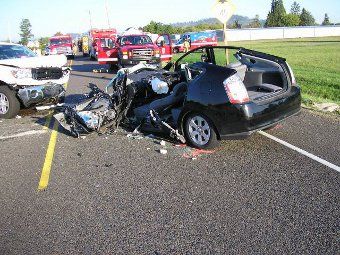To Curb Deaths, Some Police Make the Choice Not to Chase
Ingrained in every law enforcement officer are a few basic tenets: serve and protect, and catch evildoers before they can do more harm. It’s what they are paid to do, often risking their lives to accomplish those two goals.
But some departments are taking the drastic step of telling their officers to actually let the bad guy get away. That’s because in many circumstances, chasing them is simply too dangerous.
“The threat to innocent life does not justify chasing the vast majority of cars that decide not to stop for police,” says Edward Flynn, Chief of Police in Milwaukee. Six years ago, after a series of high profile crashes relating to chases, Flynn decided enough was enough, and implemented a new policy. Starting in March of 2010, officers were ordered to commence pursuits only for violent offenses.
No traffic violations. No stolen cars.
“In a three month period in 2010, we had four innocent people killed in three accidents,” Flynn said. “In every one of these tragedies the officers had realized the recklessness of the person they were chasing didn’t justify continued pursuit. One was for a stolen license plate!”
But once that pursuit begins, he noted, there is no controlling the missile which is often launched through populated neighborhoods, or streets, in the form of a fleeing car. And even if police break off the pursuit, they can’t control what the fleeing driver does next.
“I mean, I’ve buried officers who were killed in pursuits, alright?” he noted. “If you’re going to risk your life, and run the risk of that person is going to kill an innocent person, then the standard….has got to be a standard that says we’re involved in a crime of violence here. Not simply a property crime or a traffic offense, or some other low level offense.”
The new policy appears to have made a difference in Milwaukee. From 103 pursuit related crashes in 2007, to just 39 last year.
In May, NBC5 Investigates reported the alarming number of fatalities from police pursuits in the Chicagoland area: 141 pursuit-related crashes in the last ten years, resulting in 108 fatalities, and another 216 injured.
But the cases are not always easily defined.
In 2014, 20 year old Freddie Morales was walking to his car, when he was struck and killed by a Wheeling squad car, running with no lights or siren, clocked at up to 109 miles per hour. The officer who hit Morales, argued he was attempting to catch up with a speeder, and had not turned on his lights to avoid triggering a scenario where that driver might flee.
Morales, a pedestrian, was determined to have a blood alcohol level of between .158 and .228. He was killed instantly, and recently, the Village of Wheeling paid out a settlement to his family, of $853,000.
Ironically, under new chief James Dunne, Wheeling’s policy is now remarkably similar to Milwaukee’s. Dunne maintains the officer in the Morales case, who he called an “exemplary” member of his department, was truly only trying to catch up with a speeder, and was not engaged in a real chase. But like Flynn, he said he is concerned about the inherent dangers of police pursuits.
“Our policy is we won’t pursue for property crimes, or traffic,” he said. “It has to be a forcible felony.”
The true metric of any such policy, or course, is a reduction in injuries or deaths. In Milwaukee, two innocent bystanders have been killed since Flynn implemented his stricter policy. Chicago allows chases more often, and here we’ve seen 12 bystanders killed during the same period.
“As an industry, we need to re-evaluate how often we engage in this behavior,” he said. “And if the apprehension, is worth death!”
Published at 11:01 PM CDT on Jul 5, 2016
Original article at http://www.nbcchicago.com/investigations/To-Curb-Deaths-Some-Police-Make-the-Choice-Not-to-Chase-385643481.html




